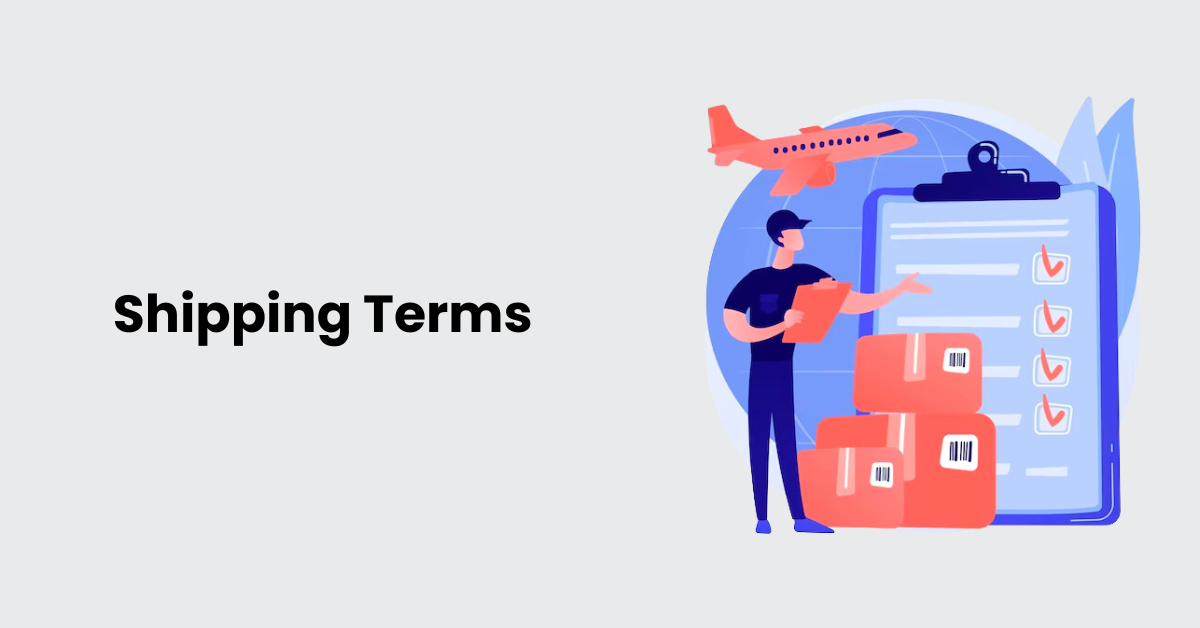A Glossary Of Shipping Terms For 2024

The logistics industry, with jargon like "dimensional weight" and "Incoterms," can be confusing. Fear not, daring shipper! The key terminology you need to know to confidently manage your deliveries is explained in this glossary of shipping terms for 2024. Whether you're an experienced online retailer or a novice international shipper, knowing these fundamental ideas will enable you to make wise choices, steer clear of unanticipated expenses, and guarantee your priceless cargo reaches its destination without incident. Thus, fasten your seatbelt, seize your figurative shipping manifest, and get ready to navigate the fascinating—and occasionally bewildering—world of 2024 shipping.
Popular Shipping Terms List:
3PL Shipping Terms
Beyond general shipping terms, 3PLs throw around jargon specific to their services. Think inventory management (receiving, storing, picking, packing), value-added services like kitting or light manufacturing, and fulfillment fees per order. You'll encounter terms like "cross-docking" (shipping without storage) and "blind shipping" (removing your branding). Technology plays a big role in Warehouse Management Systems (WMS) and integrations for seamless data exchange. Don't forget lead times, minimum order quantities, and service level agreements to ensure expectations are met. Remember, this is just a taste, so clarify any unfamiliar terms with your chosen 3PL for a smooth partnership.
FCA shipping terms
FCA, or Free Carrier, is a commonly used Incoterm (International Chamber of Commerce term) that defines the responsibilities of buyers and sellers in international trade. Here's a breakdown:
Seller's Responsibilities
- Delivers the goods to a named place: This could be a specific terminal, airport, or even the seller's premises, as designated by the buyer.
- Clears the goods for export (if applicable): This ensures they can leave the seller's country without customs issues.
- Loads the goods onto the chosen mode of transport: This includes trucks, ships, or airplanes, depending on the agreement.
Buyer's Responsibilities
- Arrange and pay for all further transport: This includes selecting the carrier, paying freight charges, and managing additional costs like insurance.
- Bears all risks and costs from the named place onwards: This includes any damage, loss, or customs duties after the seller hands over the goods.
DAP Shipping Terms
DAP, or Delivered At Place, is another widely used Incoterm defining buyer and seller responsibilities in international trade. Here's a breakdown:
Seller's Responsibilities
- Delivers the goods to the named place of destination: This location can be anywhere agreed upon, like the buyer's warehouse or distribution center.
- Unloads the goods from the arriving means of transport: This ensures the goods are safely delivered to the agreed-upon location.
- Covers all costs and risks up to the unloading point: This includes transportation fees, export clearance (if applicable), and insurance to protect the goods during transit.
Buyer's Responsibilities
- Clears the goods for import (if applicable): This involves obtaining necessary permits and paying any associated duties or taxes.
- Bears any further charges: This includes additional unloading costs, local transportation needs, and storage fees at the final destination.
FOB Shipping Terms
FOB, or Free On Board, is a frequently used Incoterm that defines the point at which the ownership and responsibility of goods shift from the seller to the buyer in international trade. However, it's important to note that FOB comes in two main versions: FOB Origin and FOB Destination.
FOB Origin
Seller's Responsibilities
- Makes the goods available at their premises or a designated location within their country.
- Loads the goods onto the chosen mode of transport.
- Clears the goods for export (if applicable).
Buyer's Responsibilities
- Arrange and pay for all transportation costs and risks from the named point of origin.
- Bears any import clearance fees and duties.
FOB Destination
Seller's Responsibilities
- Delivers the goods to the named port or terminal at the destination country.
- Loads the goods onto the chosen mode of transport.
- Clears the goods for export (if applicable).
- Arranges and pays for ocean freight charges (if applicable).
Buyer's Responsibilities
- Arrange and pay for unloading, transport within the destination country, and import clearance.
- Bears any import duties and taxes.
DDP Shipping Terms
DDP, or Delivered Duty Paid, is an Incoterm (International Chamber of Commerce term) that simplifies international shipping for buyers by placing most of the responsibility and costs on the seller. Here's what it means:
Seller's Responsibilities
- Delivers the goods to the named place of destination: This could be your warehouse, office, or any agreed-upon location.
- Bears all costs and risks associated with transportation: This includes freight charges, export and import clearance, insurance, and any additional fees like customs duties and taxes.
- Arrange and complete all necessary documentation: This ensures smooth passage through customs and avoids delays.
- Unloads the goods at the destination: This ensures they are delivered directly to your location.
Buyer's Responsibilities
- Provides clear instructions and documents: This includes the designated destination, specific unloading requirements, and necessary import permits (if applicable).
- Accepts the goods at the agreed-upon location: Once delivered and unloaded, the goods are yours.
EXW Shipping Terms
EXW, or Ex Works, is an Incoterm (International Chamber of Commerce term) that defines the minimum responsibility for a seller in international trade.
Here's a breakdown of EXW:
Seller's Responsibilities
- Makes the goods available at their premises or a named location within their country (e.g., factory, warehouse).
- Packages the goods according to export regulations (if applicable).
- Assists with loading the goods onto the buyer's chosen mode of transport (if requested).
Buyer's Responsibilities
- Arrange and pay for all costs and risks associated with transporting the goods from the named place of origin onwards, including
- Export clearance (if applicable)
- Freight charges
- Insurance
- Import clearance (including duties and taxes)
- Unloading and any further domestic transportation
CIF Shipping Terms
CIF, or Cost, Insurance, and Freight, is a commonly used Incoterm (International Chamber of Commerce term) in international trade. It outlines the responsibilities of both buyers and sellers for the transportation of goods, making it a popular choice for ocean or inland waterway shipments.
Here's what CIF entails:
Seller's Responsibilities
- Delivering the goods: The seller must make the goods available at the designated port of shipment, and cleared for export (if applicable).
- Arranging and paying for transportation: The seller covers the cost of transporting the goods to the named port of destination.
- Obtaining minimum insurance: The seller must acquire insurance coverage for the goods against loss or damage while in transit. This insurance typically covers Institute Cargo Clauses (C)**, providing basic coverage.
Buyer's Responsibilities
Paying costs at destination: The buyer assumes all costs and risks once the goods are loaded onto the vessel at the port of shipment. This includes:
Inland transportation from the port to their final destination
Customs clearance and duties
Terminal handling charges at the destination port
CPT Shipping Terms
CPT, or Carriage Paid To, is an Incoterm (International Chamber of Commerce term) used in international trade that defines the responsibilities of buyers and sellers for the transportation of goods. Here's a breakdown of what it entails:
Seller's Responsibilities
- Delivers the goods to a named place of destination: This could be a specific terminal, airport, or even the buyer's premises, as agreed upon.
- Clears the goods for export (if applicable): This ensures they can leave the seller's country without customs issues.
- Arrange and pay for transportation to the named place: This includes selecting the carrier and covering freight charges.
- Bears all risks and costs until delivery to the carrier: This includes any damage, loss, or customs duties before the goods are handed over.
Buyer's Responsibilities
- Unloads the goods from the arriving means of transport: This ensures they are safely received at the agreed-upon location.
- Bears all risks and costs from the named place onwards: This includes import clearance, duties, and any further transportation needs within the destination country.
CFR Shipping Terms
CFR, or Cost and Freight, is an Incoterm (International Chamber of Commerce term) commonly used in international trade, particularly for sea and inland waterway shipments. It defines the responsibilities of both buyers and sellers for transporting goods, offering a balance between cost and control.
Seller's Responsibilities
- Delivers the goods to the named port of shipment: This includes clearing them for export (if applicable).
- Arrange and pay for transportation: The seller covers the cost of transporting the goods to the named port of destination.
- Delivers the goods alongside the ship at the loading port: This means making them available for loading onto the vessel selected by the buyer.
Buyer's Responsibilities
Pays all costs and bears all risks from the moment the goods are loaded onto the ship: This includes:
Inland transportation from the port to their final destination
Unloading the goods from the ship
Insurance (as CFR doesn't include minimum insurance coverage)
Freight charges from the destination port onwards
Customs clearance and duties
Terminal handling charges at the destination port
DDU Shipping Terms
DDU, or Delivered Duty Unpaid, is an Incoterm (International Chamber of Commerce term) outlining the responsibilities of buyers and sellers in international trade. It offers a middle ground between seller-heavy Incoterms like DDP and buyer-heavy options like FCA or EXW.
Seller's Responsibilities
- Delivers the goods to the named place of destination: This could be your warehouse, office, or any pre-agreed location within the destination country.
- Bears all transportation costs up to the delivery point: This includes freight charges, export clearance (if applicable), and unloading the goods upon arrival.
- Clears the goods for export (if applicable): Ensures they can leave the seller's country without customs issues.
Buyer's Responsibilities
- Pays for import duties and taxes: Handles all costs associated with clearing the goods through customs at the destination country.
- Bears all risks and costs from the point of delivery: This includes any post-delivery storage, local transportation, and any additional import formalities.
Grow your Shopify Store with Manifest AI

Growing your Shopify store with Manifest AI means integrating a powerful tool that uses artificial intelligence to enhance the way your store interacts with customers. This platform analyzes customer data to deliver a personalized shopping experience and insightful analytics, helping you make smarter business decisions.
Benefits include:
- Tailored Customer Experiences: By understanding individual customer preferences and behaviors, Manifest AI can present personalized product recommendations, significantly improving the likelihood of purchases.
- Streamlined Customer Support: The platform can handle a wide range of customer queries automatically, ensuring fast and efficient responses that boost customer satisfaction.
- Data-Driven Decision Making: With access to detailed analytics on customer interactions and preferences, you can optimize your marketing strategies and product offerings to better meet customer needs.
- Increased Sales and Conversion Rates: Personalized experiences and efficient customer support contribute to higher conversion rates and repeat business, driving sales growth.
- Operational Efficiency: Automating routine tasks like customer inquiries and data analysis frees up your time to focus on strategic growth initiatives.
- Enhanced Customer Loyalty: Providing a personalized and efficient shopping experience encourages customers to return, fostering loyalty and long-term relationships.
Conclusion
This glossary has equipped you with the key terms for 2024, from EXW's buyer-centric approach to DDP's door-to-door convenience. Remember, understanding Incoterms like FCA and CFR clarifies responsibilities, minimizes surprises, and streamlines your international transactions. So, bookmark this guide, choose your terms wisely, and embark on your next shipping adventure with confidence! Remember, clear communication and informed decisions pave the way for smooth sailing, no matter the destination.
Frequently asked questions
What is FCA in Shipping Terms?
FCA, or Free Carrier, is a commonly used Incoterm (International Chamber of Commerce term) that defines the responsibilities of buyers and sellers in international trade.
What is FCL in Shipping Terms?
FCL, in shipping terms, stands for Full Container Load. It refers to a shipment that fills an entire shipping container. This contrasts with LCL (Less than Container Load), which involves multiple shippers sharing a single container.

.png)
